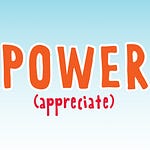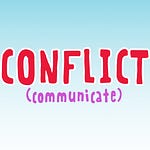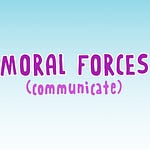Abbie: Hello and welcome to the CosmoParenting Podcast brought to you by the CMM Institute for Personal and Social Evolution. In this space, we invite you to see yourself as someone who is curious about and actively participating in creating your own meaning around parenting.
This is our ‘Validate’ episode, where in the second episode of each month we hear a parenting story, with the hope that sharing the first hand experiences of others who are parenting can make you feel seen and validated in your own experiences. Let’s begin.
*music*
Abbie: Today, I am joined by Rebekah to share a parenting story. Hi, Rebekah.
Rebekah: Hi, Abbie.
Abbie: I'm so happy that you're here and I'm so excited to hear your story today. As you know, this month is our theme of adaptation. Two generalizations that we've offered people is that (1) adaptation can be planned or spontaneous and also that (2) adaptation can be positive or negative. I'm going to leave it at that and just say, would you please share with us your story about adaptation?
Rebekah: Oof. Yeah. This is such a rich, compelling theme to me. One of the first things that came to my mind with this prompt was thinking about this pattern, this thread that I see emerging in my own little family between my own childhood and now watching my son go through childhood.
The first few years of my life were shaped by cancer treatments. I had a really aggressive cancer on my spine. And starting from the age of 14 months old, a lot of my life was in hospitals with needles and blood pressure cuffs and MRIs and surgeries. And it was a really distinct environment for a little human to grow up in. And I really responded to- or adapted to- that environment by developing a lot of really intense coping skills around ignoring pain, pretending that I'm not in pain or that I feel sick.
So I learned to be like the shiniest, best, gold star patient- always smiling, singing, always sweet, always charming, and never complaining, never whining, never crying. And getting a lot of pride and affirmation from that.
Abbie: Yeah. Yeah.
Rebekah: And of course, you know, once the cancer is gone, which- yay, thank you, medicine. Thank you, doctors- I still had those coping tools, right?
Like I had developed them before I really even have memory in a lot of ways. And so that is a tool that has limited me a lot in my adulthood. Learning to pay attention to your body being in pain is also an adaptive tool, right? Like being able to know I'm in pain is a red flag. It's a signal. And if you don't ever listen to that, you're a little lost, right?
And, so, my son, when he reached his first birthday and was getting closer to this age that I was when all of this began for me, I felt very invested in adapting that script for him and giving him a new framework for thinking about pain and his body and his experience of the world.
And when he was about one, we took him in for his very first blood draw at the doctor's office. And so we went in, my husband and I both went in with him. We're in this tiny little room. And I had been so worried about this blood draw for like the week leading up to it, like imagining his experience of pain and looking at us and realizing we're not stopping it.
Like I was very worried. And that first appointment, they put the needle in his skin, basically. And my whole body is tense, and I'm watching him, and he barely responds. Like he just scowls at everyone in the room. Like, what are you doing? And then it's over and he kind of whines a little bit.
And I heard my own voice in that moment, just like spilling out of me. And I said... way to go baby you didn't even cry you're so brave! Like, instinctively fell out of my mouth and as soon as I even heard it I just like wanted to pull it all back because I know that that is the narrative that I heard growing up. That's all well-intentioned, right, but it's this affirmation that like when you don't cry- when you don't acknowledge that pain- you've won, you've done it. And so, I knew we had another blood draw coming up in about a month. And I was very intentional leading up to that.
Like, what are the words I want to say? What is the most sturdy tool to offer him? And so we went in again, and he remembered this time. So he was already like more resistant than the first time. And he really protested physically and verbally, like he was crying. And I heard all of the other adults in the room saying, you're okay, you're okay.
And I just knew so deeply that he wasn't. And that it felt like not a sturdy parent in that moment to lie to him, right? Like to tell him that your experience right now is not real. So in the moment I said, I know, I know it hurts. It won't last forever.
And then when it was over, I said, you did it! How did it feel? And that's one that we've continually tried to affirm with him is like your experience of the world is real. Whatever moment of pain you're in will not last forever. And being able to name what you're feeling is important.
Gosh, I'm like feeling emotional even. Like I think even for me, just that idea of like your experience of the world is real. And when you feel pain, you are actually in pain. It also will not last forever. But being able to sit and bear witness to pain and not pretend that it's something that it's not or not pretend that it's not real, I think felt like some repair in me a little bit.
This adapted script is maybe one we'll continue to adapt as he gets older and pivot with different situations and different moments. But for now, it feels a lot sturdier and more useful for the long run, maybe, of a script for him to have. So... yeah.
Abbie: Yeah. I love the length of this story, because it's really easy for us to put a beginning and end on episodes of our lives. And you started your story about quote unquote- the way I prompted you to know- “your parenting story about adaptation” started with you as a child and how you were parented.
And that is a part of this story about your son's experience. And I think that feels really hopeful to me that our stories are ongoing. It's not- we're not looking back at a bunch of endings. It's all open-ended. And so this adaptation- you teaching him how to adapt- it's, you know, you're kind of meeting him in this place of also adapting.
Rebekah: Yeah. Well, and I love that you pulled that out, Abbie, because that's really comforting to me in thinking about my own son continuing to adapt and what ways he'll feel compelled to adapt. It's very striking to me how different our experiences of the world are already, he and I.
And it's very easy for me to feel like I'm going to screw this up. And then that's it. I screwed it up, you know. And you've offered us this hopeful framework of like, it's always continuing to adapt and evolve. And, and that, that can be really hopeful.
Abbie: Yeah. It's like expansive on both ends of like the story starts way earlier than you think, but it also doesn't end as early as we think either. And that is that kind of hopeful end.
And so, yeah, Rebekah, thank you so much for sharing this story. And I just think you're doing really wonderful things in the world. So I would love to give you a second to tell people where they could hear more from you. Cause I think people want to hear more from you after this.
Rebekah: Thank you, Abbie. Okay, let's see. I have a newer-ish podcast that I co-host with my beloved friend, Caitlin Metz. It's called Scratch That: Parenting and Reparenting Off Script. So we have weekly episodes where we try to do some of that work of rewriting scripts and listening to people who are rewriting scripts around parenting and person-ing.
I do have a substack called This Too, where I explore kind of the messier edges of womanhood, parenting, and disability.
And I do have a book that is already out called Sitting Pretty. It's a collection of essays exploring disability. And then I have a picture book coming out in April called We Are the Scrappy Ones. It's a picture book that I originally wrote as a poem to a group of disabled teenagers I met a few summers ago, wanting to instill in them an anthem of belonging and identity around disability.
So, yeah, a few places to find me.
Thank you for the invitation. I love this prompt. I am so excited to listen to other people's stories as well. It's a gift that you're giving us. So thank you for the prompts.
Abbie: Thank you, Rebekah. And to everyone listening, thank you for joining us, too. Don't forget to check out www.cosmoactivities.com for all our other resources in this series. All of those are available for free and it's a great way to bring your kids into this conversation and be learning together. I'd also love to invite you to comment on this podcast episode on the CosmoParenting Substack. That's a great way to be in dialogue. We're so grateful to be on this journey with you and we will see you next week to explore some parenting best practices.
*music*












Share this post